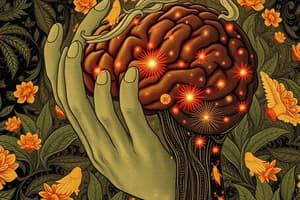Podcast
Questions and Answers
What is retroactive interference in memory?
What is retroactive interference in memory?
- Old memories fade over time without any external influence.
- New information interrupts the recall of old information. (correct)
- New experiences enhance the retrieval of past memories.
- Old information disrupts the retention of new information.
Which technique is NOT commonly used to improve memory?
Which technique is NOT commonly used to improve memory?
- Elaborative Rehearsal
- Mnemonics
- Chunking
- Proactive Interference (correct)
How can memory research be applied in therapy?
How can memory research be applied in therapy?
- Creating marketing campaigns based on memory retention.
- Improving time management skills among employees.
- Enhancing athletic performance through memory techniques.
- Developing strategies for memory-related disorders. (correct)
Which of the following statements is true regarding false memories?
Which of the following statements is true regarding false memories?
What is one benefit of spaced practice in memory retention?
What is one benefit of spaced practice in memory retention?
What is the main purpose of encoding in the memory process?
What is the main purpose of encoding in the memory process?
Which type of memory is characterized by maintaining information temporarily for 20-30 seconds?
Which type of memory is characterized by maintaining information temporarily for 20-30 seconds?
Which of the following brain structures is primarily involved in forming new explicit memories?
Which of the following brain structures is primarily involved in forming new explicit memories?
What type of memory refers to unconscious memories such as procedural skills?
What type of memory refers to unconscious memories such as procedural skills?
What method of retrieval involves identifying previously learned information?
What method of retrieval involves identifying previously learned information?
Which factor does NOT influence the process of encoding?
Which factor does NOT influence the process of encoding?
Which of the following best describes neuroplasticity in relation to memory?
Which of the following best describes neuroplasticity in relation to memory?
What is a primary cause of forgetting information?
What is a primary cause of forgetting information?
Flashcards
Proactive Interference
Proactive Interference
Old information makes it harder to learn and remember new information.
Retroactive Interference
Retroactive Interference
New information makes it harder to recall old information.
Misinformation Effect
Misinformation Effect
False memories can be created through misleading information.
Reconstructive Memory
Reconstructive Memory
Signup and view all the flashcards
Chunking
Chunking
Signup and view all the flashcards
What is memory?
What is memory?
Signup and view all the flashcards
What are the stages of memory?
What are the stages of memory?
Signup and view all the flashcards
What is encoding in memory?
What is encoding in memory?
Signup and view all the flashcards
What are the types of encoding?
What are the types of encoding?
Signup and view all the flashcards
What is storage in memory?
What is storage in memory?
Signup and view all the flashcards
What is retrieval in memory?
What is retrieval in memory?
Signup and view all the flashcards
What is the hippocampus' role in memory?
What is the hippocampus' role in memory?
Signup and view all the flashcards
What is neuroplasticity?
What is neuroplasticity?
Signup and view all the flashcards
Study Notes
Memory: Encoding, Storage, Retrieval
- Memory is the process of encoding, storing, and retrieving information.
- Studying memory is crucial for understanding learning, decision-making, and personal identity.
- It helps understand and address memory-related issues like amnesia and forgetting.
Stages of Memory
1. Encoding
- Encoding transforms sensory input into a storable format.
- Types of encoding include visual (images), acoustic (sounds), and semantic (meanings).
- Factors influencing encoding include attention, focus, and depth of processing.
2. Storage
- Storage is maintaining encoded information over time.
- Memory systems include sensory memory (brief storage of sensory input), short-term memory (temporary storage), and long-term memory (permanent storage).
- Sensory memory includes iconic (visual) and echoic (auditory) memory.
- Short-term memory has limited capacity and duration (20-30 seconds).
- Long-term memory includes explicit (declarative) memories (conscious memories like facts and events) and implicit (non-declarative) memories (unconscious procedural skills and priming effects).
3. Retrieval
- Retrieval is accessing stored information as needed.
- Methods include recall (retrieving without cues), recognition (identifying previously learned information), and relearning (faster reacquisition of knowledge).
The Brain and Memory
- Key brain structures involved in memory include the hippocampus (forming explicit memories), amygdala (emotionally charged events), cerebellum (procedural and motor memories), and prefrontal cortex (supporting working memory).
- Neuroplasticity (the brain's ability to reorganize) is crucial for memory formation and learning.
Memory Processes and Errors
- Forgetting can be caused by decay (information fading over time) or interference (new or old information disrupting recall).
- Proactive interference occurs when old information disrupts the recall of new information.
- Retroactive interference occurs when new information disrupts the recall of old information.
- False memories are inaccurate recollections often influenced by suggestion or misinformation. This includes misinformation effect in eyewitness testimonies.
- Reconstructive memory: Memory is not a perfect replay but a reconstruction based on beliefs, previous knowledge, and context.
Improving Memory
- Techniques for improving memory include chunking (grouping information), mnemonics (memory aids), spaced practice (distributing learning sessions), and elaborative rehearsal (connecting new information with existing knowledge).
- Healthy habits like adequate sleep, exercise, and a balanced diet also support memory.
Applications of Memory Research
- Memory research has implications in education (enhancing study techniques, effective curriculum design), therapy (addressing memory disorders like Alzheimer's), workplace (improving employee training), and law (increasing reliability of eyewitness testimony by mitigating misinformation effects).
Studying That Suits You
Use AI to generate personalized quizzes and flashcards to suit your learning preferences.



